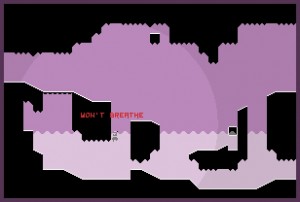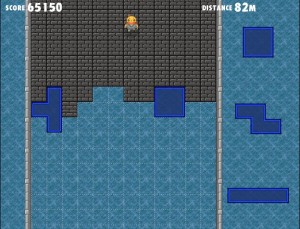Indie Rock: The Honour System
- Updated: 13th Mar, 2013
A side effect of video gaming authorship is the unwillingness, or perhaps inability, to let the player have total control over their own win or loss. That’s not a complaint, not every game would lend to the idea of the player just deciding that they haven’t died when they were supposed to, but it’s interesting to think about games that confer the chance to call fiat when you think it’s appropriate to keep playing a little longer, or have rules that totally put the incentive to join in purely on the person playing.
I played a game called “Close Your Eyes For 60 Seconds” last week. It’s very simple and you can probably guess the rules. You click the screen, a countdown appears from 5 and then after that if you open your eyes at any point between then and 60 seconds you lose. Any time after that? You win.
There’s no fanfare, you either decide to take part in it or you don’t. If you cheat, all you did was miss out on the fun of playing the game. The challenge, of course, is judging your mind’s own ability to keep time innately so that you don’t run over, or testing your patience to see if you’d even be able to keep your eyes closed that long. It puts all the interaction on the player and makes them responsible for their own fun.
Playing this game reminded me of another, one that better portrays the lengths to which this concept can extend. It’s called Asphyx, it’s by an overwhelmingly talented indie developer who goes by Droqen. He’s nominated in the IGF this year for his game Starseed Pilgrim, but we’ll cover that another week.
Asphyx is a 2D platformer that partially takes place underwater. The player is instructed to hold their breath when they’re submerged and only breathe again when they’re on dry land. If they have to breathe again when they’re underwater, they should hit ESC and it’ll take them back to a checkpoint where they start the challenge over.
 It’s really easy to cheat in Asphyx, you just never hit the ESC key and never have your progress reverted, but the game’s only fun because you’re letting yourself take part. You’re not just clambering over obstacles without any incentive to move quickly, you have an active participation in the stress of not performing well. You’re denying a biological need in order to keep playing the game.
It’s really easy to cheat in Asphyx, you just never hit the ESC key and never have your progress reverted, but the game’s only fun because you’re letting yourself take part. You’re not just clambering over obstacles without any incentive to move quickly, you have an active participation in the stress of not performing well. You’re denying a biological need in order to keep playing the game.
Having the player be in control over their own failure here makes the whole experience so much more tense. They could decide that they’ll hold their breath just that little bit longer than is comfortable and push themselves if they’re close to the surface. In any other situation there’d just be a nebulous “here’s how long you can be underwater” meter that doesn’t at all reflect the context. Sonic The Hedgehog uses quickening tempo of music to tell the player he’s drowning, but there’s no wiggle room. He drowns the same if he’s a nanosecond from the surface as he would if he’s at the floor of the ocean.
There are parts in the game where the jumps are just a little bit too tricky and though you know what you’re supposed to be doing, it’s taking just a little too long to execute the move. You think you can try again but you’re near to running out of breath and have to get to the surface. You’re pushing your own body and it’s rewarding when you just make the jump in the nick of time.
Asphyx is a great game that you should let yourself get carried away with to play it properly*. Follow the game’s rules and have a unique experience that isn’t found anywhere else.
*We at The Average Gamer should probably add that we aren’t forcing you to play this game, you make that decision yourself, and if you’re injured in any way while playing we deny all levels of accountability. Have fun!
Oh Also
Bridge Puzzle is a nice counterpoint. If you mess up it’s game over, you deserve it, you don’t have any say in the matter. Don’t mess up.
 It’s like an upside down version of Tetris where you have a bit more control over shape placement. You’re trying to build a path across a body of water for a little dude. The bridge only gets filled in when you complete a full tetris line.
It’s like an upside down version of Tetris where you have a bit more control over shape placement. You’re trying to build a path across a body of water for a little dude. The bridge only gets filled in when you complete a full tetris line.
It’s simple but it can get frantic as it gradually reduces the amount of time you have to complete actions. You’ll play the start of the game waiting for space to appear on screen to add more blocks, but that doesn’t last very long at all. Soon you’re desperately replacing blocks on screen trying to find a fast combination that will give you chance to keep going.
It’s great! Play it!

Follow Us!